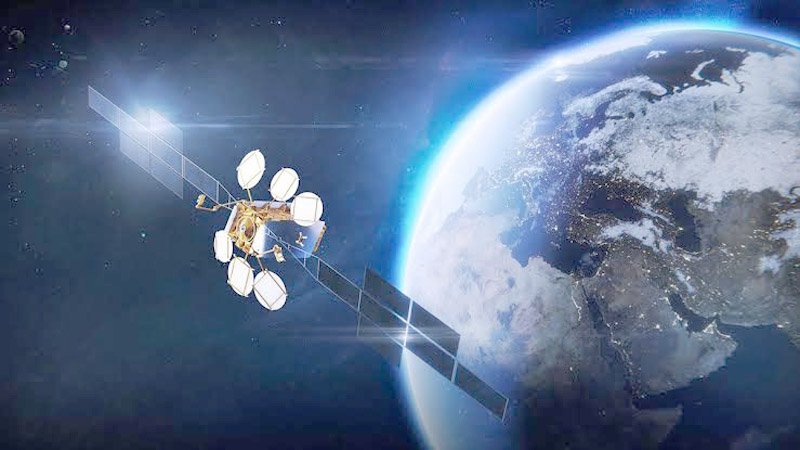London wanted to continue taking part in EU’s Copernicus programme, which uses satellites to observe and track the planet’s environmental evolution, when the UK left the EU in 2020.

If a solution is not found by the middle of 2024, the European space programme is in danger due to Brussels and London’s inability to reach an agreement on post-Brexit arrangements, with the monitoring of the EU Green Deal being the first potential victim.
London wanted to continue taking part in the EU’s Copernicus programme, which uses satellites to observe and track the planet’s environmental evolution, when the UK left the EU in 2020. However, neither side could discuss the arrangements for Horizon Europe, and consequently, the UK’s participation in Copernicus, until a resolution was reached regarding the implementation of the Northern Ireland Protocol.
As a result, the UK never made its €721 million contribution to the space programme over the period of 2021–2027, according to a note from the European Space Agency (ESA) obtained by EURACTIV.
A UK Government spokesperson told EURACTIV that following the Windsor Agreement’s signing in March and the resolution of the Northern Ireland dispute, “both the UK and the EU have been clear that we are open to taking forward discussions on UK association to EU programmes.”
However, they continued, “discussions on a course of action will need to take into account the fact that we have missed out on over two years of participation in the programmes.”
What kind of discount the UK might be eligible for in order to make up for its two-year absence from the space programme is still up for debate.
ESA has cautioned that the funding gap’s unpaid balance has “a major impact on the Copernicus Space Component.” The enhanced continuity of the [Copernicus] Program and its ability to fully and promptly support the EU Green Deal are in particular jeopardised by the Copernicus financial gap.
The delay in the UK’s inadequate financial contribution would have an immediate effect on the next generation of Copernicus satellites, which would aid in the EU’s effort to achieve climate neutrality by the year 2050 through the so-called Sentinel Expansion Missions.
Six satellites are involved in the missions, including Copernicus Anthropogenic Carbon Dioxide Monitoring (CO2M), which will enable the EU to measure CO2 emissions from all human activity levels. According to the ESA document, other Copernicus missions that are currently in orbit and in use are also in danger.
Delays in the budget until 2028 would, among other things, “reduce the flexibility and capacity of the operation to satisfactorily respond to programme needs and user expectations” for the Sentinel missions that are currently in flight.
The ESA note warns that a funding gap in the next phase of the EU’s budget would reduce the capacity of the programme to respond to emergency needs related to disaster management. To keep the programme developing, the missing contribution would have to be made available at a later stage but no later than June 2024.
This would create years of interruptions in the development of the satellites and delay their availability to support relevant EU policy needs, as well as increase the cost of the programme.
ESA advises that “since the gap needs to be recovered before mid-2024, the last funding opportunity is identified in the mid-term review of the MFF” as a way to prevent putting the entire constellation of satellites at risk.
A review of the current multi-annual budget cycle for the EU would be proposed by the European Commission before summer, but negotiations over contributions between member states might take several months.
According to MEP Christophe Grudler (Renew, France), who oversees the European Parliament’s space programme file, the likelihood of member states consenting to a review of the MFF is “not sure.”
He believed that because the UK would eventually use the satellites’ services as it pleased, it was necessary for it to pay the full amount of its contribution. He added that in this way, the UK contribution would simply close the gap in the final years until 2028.
“Up to now, the programme has not suffered; the budget was directed into the first few years,” he said. The reporteur claims that if that failed, using the EU budget or ESA’s own funds would be another choice.
Meanwhile, EURACTIV understands that the UK has been considering alternate programmes that could be quickly implemented if necessary.
Additionally, over the past two years, it has repeatedly emphasised to the EU that its businesses and researchers have been totally shut out of the programmes. Discussions about the potential association of the UK with Copernicus are currently taking place in accordance with the Windsor Framework.
This conversation will continue in the context of the UK’s potential participation in specific EU initiatives, like Copernicus, a representative of the European Commission told EURACTIV.
The European Green Deal, which the European Commission approved in 2020, is a package of legislative proposals with the overarching goal of making the European Union (EU) climate neutral by the year 2050.